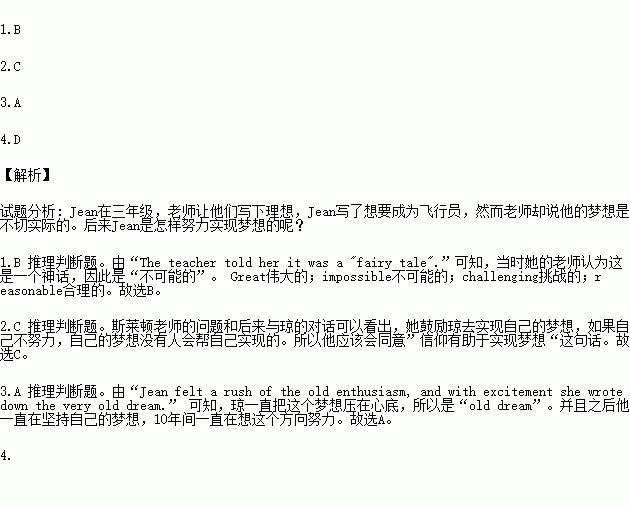题目内容
In 1959, when Jean Harper was in the third grade, her teacher gave the class an assignment to write a report on what they wanted to be when they grew up. She poured her heart into her report and expressed her dream of becoming an airline pilot. Her paper came back with an "F" on it. The teacher told her it was a "fairy tale". Jean was heartbroken and ashamed. As the years went by, Jean was beaten down by the discouragement and negativity she encountered whenever she talked about her dream. "Girls can't become airline pilots; never have, never will. You're crazy. That's impossible. "Finally Jean gave up.
In her senior year of high school, her English teacher was a Mrs. Dorothy Slaton, a demanding teacher with high standards. One day Mrs. Slaton asked this question: "If you had unlimited finances, unlimited access to the finest schools, unlimited talents and abilities, what would you do?" Jean felt a rush of the old enthusiasm, and with excitement she wrote down the very old dream.
The next thing that Mrs. Slaton said changed the course of Jean's life. The teacher leaned forward over her desk and said, "I have a little secret for you. You do have unlimited abilities and talents. When you leave school, if you don't go for your dreams, no one will do it for you. You can have what you want if you want it enough."
The hurt and fear of years of discouragement disappeared all of a sudden. Jean felt thrilled and told her about her dream of becoming a pilot. Mrs. Slaton slapped the desk top. "Then do it!" she said.
So Jean did. It didn't happen overnight. In her l0 years of hard work, even facing varieties of laugh, frustration and opposition, she never gave up her dream. Instead, she went on doing everything her third-grade teacher said was fairy-tale.
Eventually, Jean Harper became a Boeing 737 captain for the United Airline Company.
1.Jean’s third-grade teacher thought her dream to be ____________.
A. great B. impossible
C. challenging D. reasonable
2.Mrs. Slaton may hold the view that _____________.
A. only some of her students have great potential
B. her students are good enough to be admitted to the best schools
C. belief contributes to realizing a dream
D. Jean was to have her dream realized
3.According to the passage, we can infer that___________.
A. Jean’s dream was always in her deep heart
B. Jean owed her success to all her teachers
C. most people around Jean approved of her dream
D. Jean achieved her dream with ease
4.Which is the best title of the passage?
A. A Respectable Teacher B. How to Realize a Dream
C. Hard Work Pays off D. Reach for the Sky


 a time when children are beginning to establish their own identity apart from their parents. Smoking can be an act of rebellion(反抗) against parents or authority figures, as well as a way to fit in with others and feel accepted.
a time when children are beginning to establish their own identity apart from their parents. Smoking can be an act of rebellion(反抗) against parents or authority figures, as well as a way to fit in with others and feel accepted. e discussion will not be enough to help your child not to smoke.
e discussion will not be enough to help your child not to smoke.